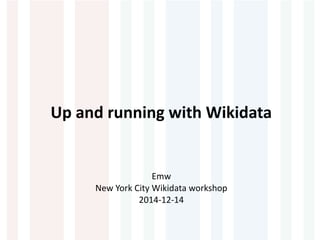
Up and running with Wikidata
- 1. Up and running with Wikidata Emw New York City Wikidata workshop 2014-12-14
- 2. Wikidata is a free linked database that can be read and edited by humans and machines.
- 3. Wikidata's goals ● Centralize interwiki links ● Centralize infoboxes ● Provide an interface for rich queries ● Structure the sum of all human knowledge
- 4. What you'll learn from this talk ● How to edit Wikidata ● How to classify ● Ideas for small projects ● Wikidata vocabulary ● Where to find things ● Awesome tools
- 5. Elements of a Wikidata statement
- 6. Example: New York City (Q60)
- 7. Items and properties ● Each item and property has its own page ● Items – Represent subjects: Douglas Adams, Challenger disaster – Have identifiers like Q42, Q921090 – 12,906,291 items ● Properties – Represent attribute names: occupation, has cause – Have identifiers like P106, P828 – 1,329 properties
- 8. Statements and claims ● Claims – Claims are “triplets” ● Formally: subject, predicate, object ● In Wikidata: item, property, value ● Example: Douglas Adams, occupation, author ● Statements – A claim is only part of a statement – Statements also include: ● References ● Ranks
- 9. Qualifiers, ranks, references ●Qualifiers – Qualifiers are properties used on claims rather than items – “Yonkers population 12,733 at time (P585) 1860” ●Ranks – Preferred, normal, deprecated – Useful to mark outdated claims ●References – Source of claim; provenance – “... stated in (P248) 1860 United States Census”
- 10. More on Wikidata vocabulary https://www.wikidata.org/wiki/Wikidata:Glossary
- 11. Finding Wikidata items Wikipedia articles have a Wikidata item link in the left navigation panel.
- 13. Finding Wikidata items Wikidata search is quick and effective. Instant search suggests items that have labels or aliases matching your keyword.
- 14. Search by label
- 15. Search by alias: “flu” -> influenza
- 16. Finding properties ● Is there a property for “number of windows”? ● What was the ID of that property, again? ● Search – In main site search box, prefix search term with “P:” – “P:number of”, “P:occupation” – Instant search doesn't work for properties, only items ● Browse – https://www.wikidata.org/wiki/Wikidata:List_of_properties ^ bookmark this!
- 18. Walking through edits for: Yonkers, New York https://www.wikidata.org/wiki/Q128114
- 19. Yonkers TODO https://www.wikidata.org/wiki/Q128114 ● population (P1082) claims for historical table in https://en.wikipedia.org/wiki/Yonkers,_New_York#Demographics ● Include references! “1860 United States Census”, etc. ● To add to item from inbofox: – head of government (P6), office held by head of government (P1313) – date of foundation or creation (P571) – ZIP code (P281)
- 20. Area? Population density? ● Properties with units (km^2, people/km^2, $) are not yet possible ● “Units” datatype in development ● https://phabricator.wikimedia.org/T65722
- 21. Tools – Querying: Autolist, by Magnus Manske ● http://tools.wmflabs.org/autolist/autolist1.html – Batch editing: Widar, by Magnus Manske ● https://tools.wmflabs.org/autolist/ – Software framework: Wikidata Toolkit, by Markus Kroetzsch et al. ● https://www.mediawiki.org/wiki/Wikidata_Toolkit ● https://github.com/Wikidata/Wikidata-Toolkit
- 22. Querying in Wikidata List of politicians who died of a heart attack Pseudo-query: occupation: politician AND cause of death: heart attack occupation: P106 politician: Q82955 cause of death: P509 heart attack: Q12152 Wikidata query in Autolist: claim[106:82955] AND claim[509:12152]
- 24. Classification on Wikidata ● Taxonomy of knowledge ● Enables powerful inference, novel applications ● Interesting philosophical, design, and engineering issues
- 26. Tree of Porphyry User:VoiceOfTheCommons, CC-BY-SA 3.0
- 27. Classes and instances ● Plato is a human is a animal ● Plato instance of human subclass of animal ● Instance: concrete object, individual ● Class: abstract object
- 28. Classification on Wikidata ● instance of (P31) – rdf:type in RDF and OWL – 11,930,243 usages – Most popular Wikidata property ● subclass of (P279) – “all instances of A are also instances of B” – rdfs:subClassOf in RDF and OWL – 170,571 usages
- 29. Examples ● USS Nimitz instance of Nimitz-class aircraft carrier Nimitz-class aircraft carrier subclass of aircraft carrier ● 2012 Cannes Film Festival instance of Cannes Film Festival Cannes Film Festival subclass of film festival ● an individual charm quark instance of charm quark charm quark subclass of quark ^ Many “leaf nodes” in Wikidata's taxonomic hierarchy are not instances. (There are no items about individual quarks on Wikidata!) https://www.wikidata.org/wiki/Help:Basic_membership_properties
- 30. Bad smells Item has many instance of or subclass of claims Items typically satisfy a huge number of instance of claims: ● Fido instance of dog ● Fido instance of English Pointer ● Fido instance of faithful animal ● … Solution: use one class for instance of, put other class knowledge into normal properties ● Fido instance of dog ● Fido breed: English Pointer ● Fido known for: faithfulness ● ...
- 31. Bad smells subclass of claim that is nonsensical when interpreted as “All instances of A are also instances of B” Example: dog subclass of pet But not all dogs are pets! feral dog subclass of dog true feral dog subclass of pet false :. dog subclass of pet false Solution: put “pet” knowledge about dogs into claim that does not apply to all instances of dog. E.g. “dog has role pet”. (Has role would not be transitive. Also needed: some/all quantifier.)
- 32. Classification on Wikidata ● Last but not least: part of (P361) – Third basic membership property – Top-level “part-whole” relation ● Instance of, subclass of and part of are all transitive ● Transitive relation: A subclass of B B subclass of C :. A subclass of C https://www.wikidata.org/wiki/Help:Basic_membership_properties
- 33. Ideas for small projects ● Add data about towns and cities – population (P1082) – head of government (P6) ● Add medical knowledge about historical figures – medical condition (P1050) – cause of death (P509) – manner of death (P1196) ● Add cultural knowledge about works of art – instance of (P31) – creator (P170) – material used (P186) – collection (P195)